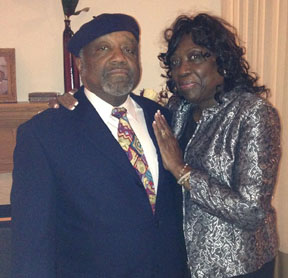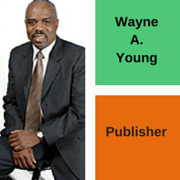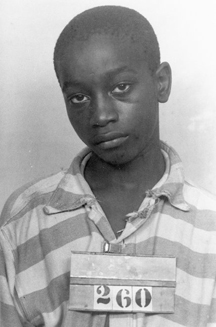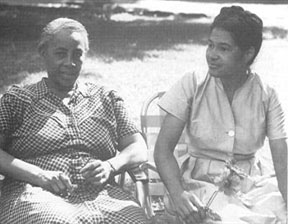 My mother (pictured left with my father) asked, “Kenny, do you need to go the hospital?” I looked on as she placed her hand on my father’s shoulder and helped him to the bathroom. Knowing that clutching one’s chest is the universal sign of a heart attack, I gauged my father’s reaction and started walking toward the phone. My father, still clutching his chest, insisted that he was only having heart burn. He asked my mother repeatedly to fix him tea to help ease his pain. But my mother and I were not convinced. I called 911.
My mother (pictured left with my father) asked, “Kenny, do you need to go the hospital?” I looked on as she placed her hand on my father’s shoulder and helped him to the bathroom. Knowing that clutching one’s chest is the universal sign of a heart attack, I gauged my father’s reaction and started walking toward the phone. My father, still clutching his chest, insisted that he was only having heart burn. He asked my mother repeatedly to fix him tea to help ease his pain. But my mother and I were not convinced. I called 911. The dispatcher asked me if my father had the following symptoms: dizziness, sweating, cold and clammy skin, and chest pains. She also asked if he was vomiting. I reported that he had five out of the six symptoms. He was not vomiting. She told me that the ambulance was on the way and disconnected. I went back into the bathroom to check on my father and by this time he was walking to the sink and beginning to vomit. I raced back to the phone to call 911 again and updated the dispatcher.
As I walked backed to the bathroom, I thanked God that my father was still talking and able to move around. But, his face was all contorted revealing just how much pain he was enduring. Then, I thought: “Where’s the ambulance? Will this be my last night with my dad? Please not like this.”
When the EMTs arrived, they began to work on my father and the knot that had built up in my stomach started to subside. He was fully conscious and in extreme pain, but at least he was able to talk to the EMTs and able to move around by himself.
My father was loaded into the ambulance and as my mom and I walked to my car, I dialed my sister. Before the ambulance reached the hospital, it stopped abruptly on Branch Avenue. “Why did they stop?” my mother asked. But, I couldn’t respond. I was too busy waiting for the EMTs to step out, walk over to my car, and tell me that my father was gone. After eight minutes, the ambulance started up again in the direction of the hospital. Oh, Thank God! I thought. Later on that night, we would learn that the EMTs had a hard time finding a vein to attach my father to an IV and that is why they had stopped.
My father is 63-years-old and has a history of heart problems. He was told to adopt more healthy eating habits and engage in mild forms of exercise. As a fitness instructor, I encounter so many clients who have health conditions. I constantly give advice about what foods to eat, ways to reduce stress, and how to exercise more. I know the foods my dad should eat and how he should exercise, but I also know that he is going to follow his own advice. I cannot force my dad to be healthy.
As a fitness professional, I thought what did I learn from this event that I could take to my clients? I came up with the following reflections that can be used for any one regardless of their health and fitness status:
- Get CPR certified every two years! Knowing how to handle an emergency health situation can mean life or death if someone is able to assist the person having the emergency before first responders arrive on the scene. Time is often the single most deciding factor for survival and may give someone a fighting chance to live during an emergency.
- Know your health status and the health status of your loved ones. The more information one can provide to emergency health care professionals during an emergency, the better. My mother was able to tell the EMTs that my father suffered from a weak heart, had congestive heart failure, had a pacemaker, and internal defibrillator.
- Stay current on health care tips for emergency situations. For example, chewing an aspirin during a heart attack can help the victim.
- Follow the doctor’s orders! If a primary care physician recommends dietary changes and exercise along with medications to help with whatever health conditions that you have, follow her advice. My mother and I learned that my father had actually done damage to his heart by not taking the heart medications his doctor had prescribed for him.












